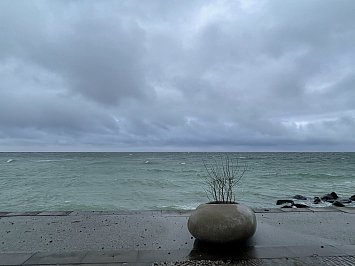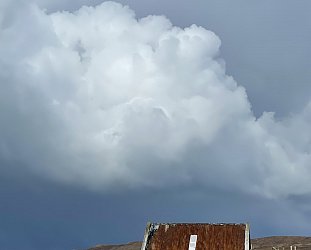Graham Reid | | 2 min read

Like many people, we celebrate our wedding anniversary, usually at a decent but modestly priced local restaurant but sometimes, if we’re flush, by going away for a couple of days.
This year, being in Stockholm, we decided to go to the World Heritage listed, medieval walled town of Visby on Gotland, the largest island in the Baltic Sea.
The route south from Stockholm is an unedifying 50 minute bus trip to the port town of Nynäshamn then a three hour journey on a massive, comfortable ferry capable of carrying 1650 passengers and 500 vehicles.
A small cloud hung over the trip: two days before we’d visited Stockholm’s recently opened Vrak: The Museum of Wrecks beside the excellent Viking Museum and the Spritmuseum (all things Swedishly boozy).
Here high-tech displays, holograms, films, artifacts and Virtual Reality experiences remind of the thousands, if not hundreds of thousands, of vessels – and their human cargo – taken to the bottom of the dark Baltic by indifferent and overwhelming nature, foolhardy captains, battles or bad luck. Sometimes a combination of all those.
Wrecks at the bottom of the Baltic lie in cold, still water where microorganisms are virtually non-existent. Which means they and their debris are preserved, often almost intact, and are mute testimony to lives lost over many millennia, right up to the MS Estonia sinking in 1994 which claimed 852 lives.
Cold thoughts to ponder on a journey across cold waters.
Oh, and we left for Gotland on the day American and European political pundits said Russia would invade Ukraine.
Because of Gotland’s strategic position, Sweden had sent a small rapid reaction force of 150 military personnel with equipment (a “contingency adjustment” according to a senior military spokesman) and the defence minister said an attack against Sweden couldn’t be ruled out.
The home port of Russia’s Baltic Fleet – beefed up with landing craft and on manoeuvres nearby – is just 300km from Gotland. Their submarines swim in these waters.
“The Russians could be here in an hour,” said a woman in bar in Visby.
The medieval walls built to impose taxes on merchants and which were frequently overrun by invaders (those pesky Danes) would be no use against a 21st century enemy.
Not that anyone seriously thinks anything would happen on Gotland – Sweden isn’t a member of NATO but would have its backing. But the volatile situation is a reminder that while New Zealand is aggravated by a rabble of inchoate voices, this part of the world faces more deadly and imminent issues.
Freedom means something different when your country has been under the yoke of totalitarianism.
For all of recorded history this vast region has been at the mercy of marauders, divisive religions, disputatious royals and rapacious expansionism by maniacal leaders.
When the tanks start rolling, no one can be sure where – or if – they might stop.
However picturesque Visby, with 13th century buildings and dramatic ruined churches, was quiet. A bitter horizontal wind off the sea whipped through the narrow cobbled streets. The town was mostly empty as people remained behind the massive thick walls of homes, bars and restaurants. In summer it’s as crowded as Venice was before Covid.
But we enjoyed the silent streets and our anniversary.
Although it was to think six centuries ago the people here were as fearful of invaders as those in Ukraine today.
Next year at this time we’ll remember cold, historic Visby sheltering behind its ancient walls, the ferry across that grey Baltic graveyard and whatever has happened in Ukraine.
We’ll probably take a ferry under the summer sun to a vineyard on Waiheke.
.
For other articles in this series go here.





post a comment